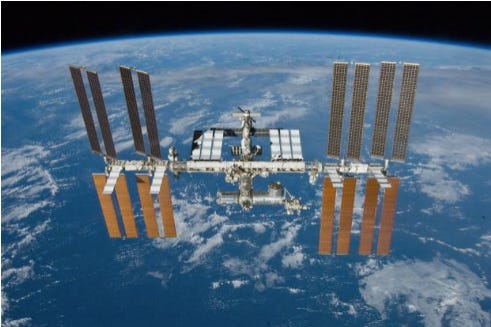I wrote this little anecdote in 2016, and the experience remains one of my fondest memories. It’s one of those rare moments of simple human connection between strangers, dropping all pretenses and just existing in the wonder of it all.
I was at the supermarket that evening in 2016 because I wanted to check my email, and we had run out of our monthly gig allotment on the crappy rural satellite internet we had at the time.
This particular Ingles has a Starbucks inside, and a cafe area with free wifi. So there I sat, typing away on my laptop, sipping at my too-hot chai, when I noticed that someone very tall was standing rather close to me. Just standing. I looked up to see a 60’s-ish man in smart Ingles managerial dress gazing out of the window, scratching his scalp at the crest of his receding hairline. I couldn’t help but stare; his expression as he peered out into the dark seemed distinctly out of place on the face of a supermarket manager. If I had to pin down the emotional source of that expression, I’d call it wonder. Or maybe longing.
The manager snapped out of his window-gazing daze to check his watch. (Yes, this man wore an actual watch. I would not deceive you.) Apparently, the time for Something was upon us. He looked around the cafe excitedly and asked, “Do you know what time the space station is going to be visible?”
Now, I am a fairly enthusiastic enjoyer of All Things Space. I go up on the parkway when there’s a meteor shower. I get all misty-eyed when NASA proposes sending probes to yet-unexplored planets. I write intergalactic travel stories. I watch Space-X rocket launches with my kid. I consume science fiction (both literature and film) with a mad passion. And I have been known to fantasize about living under an overturned salad bowl on Mars as part of the Stage 1 terraforming crew (handling the preliminary equipment set-ups and so on). But I must admit that it had escaped my attention that the International Space Station’s orbital path would bring it to my neighborhood on that particular night. I said as much, and the people at the table next to me looked up long enough to shrug their shoulders before returning to their riveting game of World of Warcraft.
The manager pushed his glasses up his nose and shifted nimbly from foot to foot. He said, “I think it’s about to fly over right now. One of the bag boys told me about it. Rick.” His eyes widened. There was no doubt about it. The dude was straight up breathless with excitement. He was aflame. He was about to swing right off his tenterhooks. My writer’s mind started filling in his backstory. Inspired by the Apollo missions as a boy, he’d wanted to be an astronaut when he grew up, but he was afflicted with bad joints, or a malformed lung. Or maybe he was just too tall. He tried drinking coffee and smoking cigarettes to stunt his growth, but to no avail. Faced with the horrible unfairness of it all, he chose a career in grocery store management because, as his father insisted, people always need to eat.
“Oh, I think it’s flying over now! Rick’s out there looking at it!” and the manager turned quickly on his heel and positively speed-walked out of the cafe, toward the automatic sliding doors, and into the parking lot.
I had to follow. Even though I’d seen the space station and other satellites fly over countless times, I needed to see it again. Perhaps it was that the manager’s eagerness was contagious. I don’t know. I packed my laptop up (because I’m not making the mistake of leaving it sitting on a cafe table ever again, even for a second), and went out into the parking lot.
By the time I arrived, there were five random people standing in the middle of the front traffic lane, looking up at the sky. The bag boy, Rick; the manager; and three customers. And me, so that’s actually six. Sure enough, ISS was making its swift arc over our neck of the woods. For a minute, no one spoke. Then the manager, his voice straining with emotion, said, “This is once in a lifetime.”
“Not really,” said a short, stocky man who had just joined our impromptu skygazing party, making us seven. “It happens quite often. It’s just that it’s a particularly clear night, so it’s really easy to see.”
“Yeah,” I said, “Doesn’t it orbit the globe every forty-five minutes or something?”
“Ninety minutes,” said the stocky guy, our residential space station expert. In my mind I nicknamed him Copernicus. “But whether or not you can see it depends on Earth’s rotation in relation to the satellite’s orbital angle.”
“Ohhhh,” said Rick, the bag boy. “I wonder how fast it’s going.”
“About 15,500 miles per hour,” said Copernicus.
“Wow.”
I looked around. There were now eleven people blocking traffic in front of the grocery store, looking up at the sky in rapt fascination. Three of them were children. It gave me such a feeling of hope. Earlier that week, I’d been commiserating with a friend over the seeming lack of excitement our culture has for space exploration. But this, this completely random, serendipitous moment shared among eleven strangers in front of the supermarket, totally proved me wrong.
And then it was gone.
We awoke from our collective reverie and went our separate ways. Rick the bagger and Mr. Manager and I returned to the grocery’s fluorescent bosom, along with the lady with the three kids. Copernicus and the other customers pushed their carts dreamily off into the parking lot.
Inside, I overheard Rick the bag boy telling a teenaged female cashier about the experience.
“NASA’s flying over the Ingles?” she said, a twinge of nervousness in her voice. “Why would they do that?”
I sighed and went back to my chai. On my way I passed Mr. Manager, sorting restock items, a glimmer of a smile on his lips. He shook his head gently and dabbed at the moisture collecting in the corner of his eye.
Often, in these dystopian days, I fear that these beautiful and already rare moments of shared wonder, of serendipitous connection between human beings will become rarer and rarer still, until they are no longer possible.
The only strategy I have to stem the tide of increasing isolation is to talk to strangers. My advice to you today is to strike up a conversation with someone at the supermarket. Remind them, and yourself, that there’s more to life than political strife, TikTok videos, future uncertainty, and the rising cost of chicken. There’s this moment, now; there are deep wells of emotion and insight in each person we encounter; and there is an always-available awe to experience in such simple acts as looking up at the sky.
Thank you for reading!
If you love this essay, please share it. If you’d like more essays (and fiction!) in your inbox, subscribe for free! And if you’d like to support this newsletter and my other projects, please consider the options below.
-Starr
Get the Book
In times of real-world dystopia, dissenters must not surrender to fear and delusion, but become active protagonists in the story of restoration and realignment. The Great Reset, technocratic agendas, mass delusion, and economic insanity will create outer crises, but they can’t crush the protagonist’s spirit.
As in all good stories, the path will be difficult, with many obstacles along the way. And like all heroes, the dystopian survivor will need to develop his character in response to each struggle. Only in this way can he gain the strength he’ll need for the final battle.
By devoting ourselves to inner growth and outer integrity, we hasten dystopia’s end and acquire the skills and qualities that will be needed for rebuilding.
How to Survive Dystopia (With Your Humanity Intact) is a guide to the hero’s journey through the dystopian landscape.
The book is available in paperback and on virtually all digital platforms. Find your preferred format:
Social Links
Follow me on Twitter
Connect with me on MeWe
Follow me on TikTok
Subscribe to my YouTube channel





